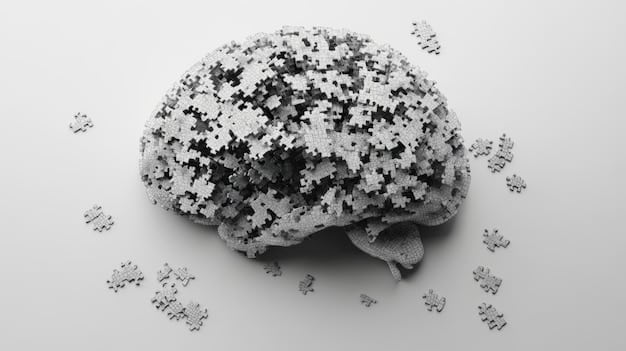Sleep Deprivation’s Impact on Cognitive Function: Latest Research

The Impact of Sleep Deprivation on Cognitive Function: What the Latest Research Shows reveals a significant decline in attention, memory, and decision-making abilities, highlighting the necessity of adequate sleep for optimized cognitive performance and overall well-being.
Ever wondered how those sleepless nights are truly affecting your brain? The Impact of Sleep Deprivation on Cognitive Function: What the Latest Research Shows is more profound than just feeling tired. Let’s delve into the science behind it.
Understanding Sleep Deprivation
Sleep deprivation, a common ailment in our fast-paced modern lives, goes beyond simple tiredness. It involves not getting enough sleep, whether chronically or acutely, leading to a cascade of negative effects on both physical and mental health. It’s crucial to understand its nuances to appreciate its impact on cognitive function.
Defining Adequate Sleep
What exactly constitutes ‘enough’ sleep? The answer varies from person to person but generally, adults need around 7-9 hours of quality sleep each night. This duration allows the body and mind to repair, consolidate memories, and prepare for the day ahead. When this need isn’t met, sleep deprivation sets in.
Causes of Sleep Deprivation
Sleep deprivation can stem from a multitude of factors. Stress, long work hours, poor sleep habits, underlying health conditions, and even excessive screen time before bed can all contribute. Identifying and addressing these causes is a critical first step in mitigating the effects of sleep deprivation.
- Stress and anxiety are significant disruptors of sleep.
- Shift work and irregular schedules throw off the body’s natural clock.
- Medical conditions like sleep apnea can interrupt sleep patterns.
- Poor sleep hygiene, such as inconsistent bedtimes, can also contribute.
Sleep deprivation is more than just a personal inconvenience; it has widespread implications for our health and cognitive abilities. Recognizing its causes and symptoms is paramount to addressing this pervasive issue.
The Direct Link Between Sleep and Cognitive Abilities
Sleep isn’t just downtime for the body; it’s crucial for the brain’s optimal function. Research increasingly shows a direct and undeniable link between sleep quality and a range of cognitive abilities. Understanding this connection is key to appreciating the full impact of sleep deprivation on cognitive function.
Sleep’s Role in Memory Consolidation
One of the most critical cognitive processes dependent on sleep is memory consolidation. During sleep, especially the deeper stages, the brain replays and strengthens newly formed memories, making them more stable and accessible. Sleep deprivation disrupts this process, leading to impaired recall and learning difficulties.
Impact on Attention and Focus
Sleep-deprived individuals often struggle with attention and focus. The ability to concentrate, maintain alertness, and filter out distractions is significantly reduced. This can have serious consequences in tasks that require vigilance, such as driving or operating machinery.

Sleep and Executive Functions
Executive functions, which include planning, problem-solving, and decision-making, are also heavily reliant on adequate sleep. Sleep deprivation impairs these higher-level cognitive processes, leading to poor judgment and increased risk-taking behavior.
- Lack of sleep diminishes cognitive flexibility.
- Decision-making becomes impulsive and less rational.
- Planning and organization skills are significantly affected.
- Difficulty with multitasking emerges.
The relationship between sleep and cognitive abilities is intricate and multifaceted. Sleep is not merely a luxury; it’s a fundamental requirement for maintaining optimal cognitive function and overall well-being. Without it, our cognitive abilities suffer dramatically.
Specific Cognitive Functions Affected by Sleep Loss
When we skimp on sleep, the repercussions extend to a range of specific cognitive functions. Let’s examine some of the key areas of cognitive performance that are most vulnerable to the impact of sleep deprivation on cognitive function.
Memory and Learning
Sleep deprivation severely impairs both short-term and long-term memory formation. The brain’s ability to encode new information and retrieve existing memories is compromised. This has significant implications for learning, academic performance, and everyday tasks that require recall.
Decision-Making and Judgment
Our capacity to make sound decisions and exercise good judgment suffers when we’re sleep-deprived. The prefrontal cortex, responsible for these cognitive functions, is particularly sensitive to sleep loss, leading to impulsive choices and an impaired ability to assess risks.
Reaction Time and Alertness
Reaction time and alertness are crucial for many aspects of daily life, from driving to responding quickly in emergency situations. Sleep deprivation slows down reaction times, making individuals more prone to errors and accidents.

Language and Communication
Sleep loss can also affect language processing and communication skills. Individuals may struggle to find the right words, formulate coherent sentences, and understand complex information. This can lead to difficulties in social interactions and professional settings.
Sleep deprivation has a far-reaching impact on various specific cognitive functions. From memory and decision-making to reaction time and language, our cognitive abilities are intrinsically linked to the quantity and quality of our sleep. Prioritizing sleep is essential for maximizing cognitive potential and minimizing the risks associated with sleep loss.
The Long-Term Effects of Chronic Sleep Deprivation
While a night or two of poor sleep might result in temporary cognitive deficits, chronic sleep deprivation can lead to more serious and long-lasting consequences. It’s crucial to acknowledge the potential long-term effects of the impact of sleep deprivation on cognitive function.
Increased Risk of Neurodegenerative Diseases
Emerging research suggests that chronic sleep deprivation may increase the risk of neurodegenerative diseases like Alzheimer’s disease. Sleep plays a critical role in clearing metabolic waste from the brain, and disrupted sleep patterns can lead to the accumulation of harmful proteins associated with these conditions.
Mental Health Disorders
Chronic sleep deprivation is closely linked to mental health disorders, including depression, anxiety, and bipolar disorder. Lack of sleep can exacerbate existing mental health conditions and increase the likelihood of developing new ones.
Impaired Immune Function
Sleep deprivation weakens the immune system, making individuals more susceptible to infections and illnesses. Chronic sleep loss can disrupt the production of immune cells and impair the body’s ability to fight off pathogens.
- Increased inflammation throughout the body.
- Higher risk of cardiovascular disease.
- Metabolic dysfunction and weight gain.
- Reduced quality of life and overall well-being.
The long-term effects of chronic sleep deprivation extend far beyond temporary cognitive deficits. It’s crucial to prioritize sleep as a fundamental component of overall health and to address any underlying sleep disorders to mitigate these risks. Investing in sleep is an investment in long-term cognitive and physical well-being.
Strategies to Improve Sleep Quality and Cognitive Function
The good news is that there are many effective strategies to improve sleep quality and counteract the negative impact of sleep deprivation on cognitive function. By adopting healthy sleep habits and addressing underlying sleep issues, individuals can optimize their cognitive abilities and overall well-being.
Establishing a Consistent Sleep Schedule
One of the most important steps is to establish a consistent sleep schedule. Going to bed and waking up at the same time each day, even on weekends, helps regulate the body’s natural sleep-wake cycle and promotes better sleep quality.
Creating a Relaxing Bedtime Routine
A relaxing bedtime routine can signal to the body that it’s time to sleep. This might include taking a warm bath, reading a book, listening to calming music, or practicing relaxation techniques like deep breathing or meditation.
Optimizing Your Sleep Environment
Creating a conducive sleep environment is essential. This means ensuring that your bedroom is dark, quiet, and cool. Investing in blackout curtains, earplugs, or a white noise machine can help minimize disturbances and promote restful sleep.
- Avoid caffeine and alcohol before bed.
- Limit screen time in the evening.
- Get regular exercise, but not too close to bedtime.
- Consider cognitive behavioral therapy for insomnia (CBT-I).
Improving sleep quality is not just about sleeping more; it’s about optimizing the conditions for restorative sleep. By adopting these strategies, individuals can enhance their cognitive function, improve their overall health, and enjoy a better quality of life. Prioritizing sleep is an investment in cognitive well-being.
The Role of Naps and Sleep Banking
While prioritizing consistent nighttime sleep is essential, strategic napping and “sleep banking” can also play a role in mitigating the impact of sleep deprivation on cognitive function. Let’s delve into the benefits and considerations of these approaches.
The Benefits of Short Naps
Short naps, typically 20-30 minutes in duration, can provide a quick boost to alertness and cognitive performance. These “power naps” can improve reaction time, enhance memory consolidation, and reduce daytime sleepiness without causing grogginess.
Sleep Banking for Anticipated Sleep Loss
“Sleep banking” involves intentionally getting extra sleep in the days leading up to a period of anticipated sleep loss, such as before a big project or during travel. This strategy can help build up a sleep reserve that can buffer against the negative effects of sleep deprivation.
Cautions and Considerations
While naps and sleep banking can be beneficial, they’re not a substitute for consistent nighttime sleep. Overreliance on naps can disrupt the natural sleep-wake cycle, and excessive sleep banking can lead to daytime sleepiness. It’s important to use these strategies judiciously and in conjunction with healthy sleep habits.
Naps and sleep banking can be valuable tools for managing sleep deprivation, but they require a thoughtful approach. Short, strategic naps can provide a quick cognitive boost, while sleep banking can help prepare for anticipated sleep loss. However, these strategies should complement, not replace, consistent and high-quality nighttime sleep.
| Key Point | Brief Description |
|---|---|
| 😴 Memory Consolidation | Sleep helps in strengthening memories. Lack of sleep impairs this process. |
| 🧠 Executive Functions | Sleep deprivation affects planning, decision-making, and problem-solving. |
| ⏰ Consistent Schedule | Maintain a regular sleep schedule to regulate the body’s sleep-wake cycle. |
| 💤 Relaxing Routine | Create a calming bedtime routine to signal the body it’s time to sleep. |
Frequently Asked Questions
▼
While individual needs vary, most adults benefit from 7-9 hours of quality sleep each night to support optimal cognitive and physical function. Listen to your body and adjust accordingly.
▼
While catching up on sleep can help alleviate some of the negative effects, it’s not a perfect solution. Prioritizing consistent sleep throughout the week is the most effective approach.
▼
Common signs include daytime sleepiness, difficulty concentrating, irritability, impaired memory, and increased susceptibility to illness. If you experience these symptoms, consider evaluating your sleep habits.
▼
Yes, many apps and wearable devices can track your sleep patterns, providing insights into sleep duration, sleep stages, and sleep quality. However, it’s crucial to use them as a tool to guide, seeking professional advice for concerns.
▼
If you consistently struggle with sleep despite implementing healthy sleep habits, or if you suspect you have a sleep disorder like sleep apnea, consult a healthcare professional for evaluation and treatment.
Conclusion
In conclusion, the impact of sleep deprivation on cognitive function is undeniable. From memory and decision-making to reaction time and overall mental health, sleep plays a crucial role in maintaining optimal cognitive performance. By prioritizing sleep and adopting healthy sleep habits, individuals can protect their cognitive abilities and improve their overall well-being, and counteract the impact of sleep deprivation on cognitive function.





